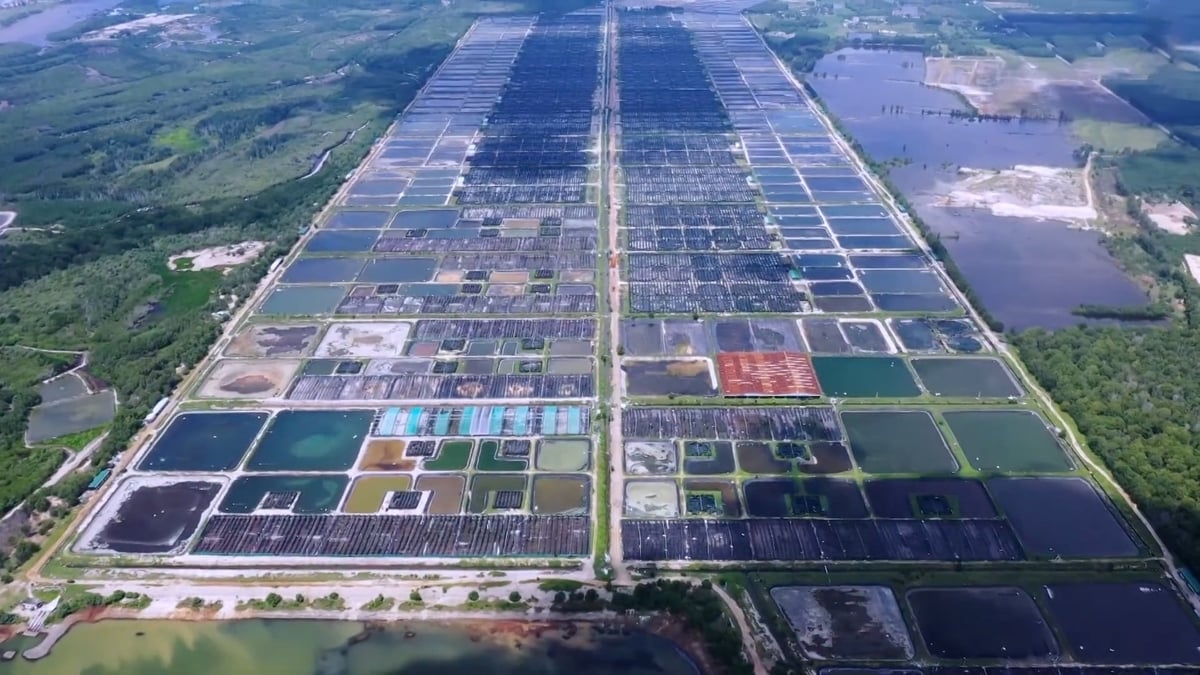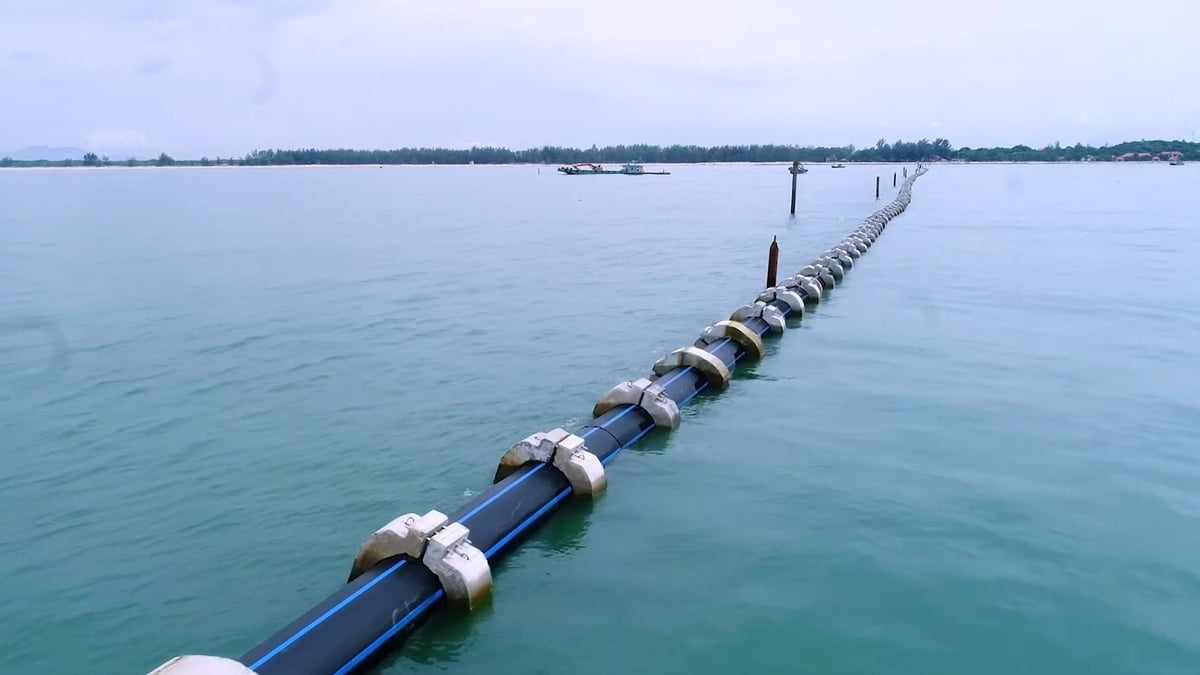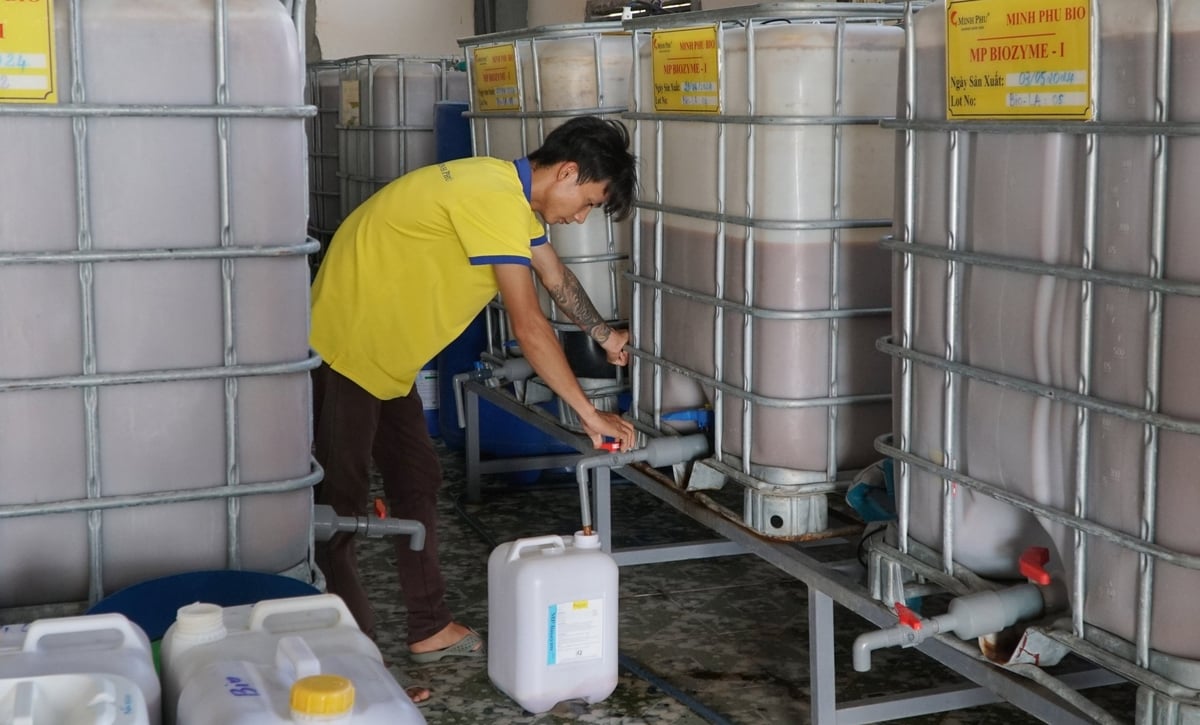October 27, 2025 | 09:39 GMT +7
October 27, 2025 | 09:39 GMT +7
Hotline: 0913.378.918
October 27, 2025 | 09:39 GMT +7
Hotline: 0913.378.918
During the rainy days, many shrimp farming households in the coastal areas of Ho Chi Minh city are full of worries because shrimp ponds are susceptible to environmental changes. However, the high-tech farming area of Minh Phu Loc An Aquaculture Company Limited (Phuoc Hai commune) is still operating without problems. The pond water is blue and clear, the shrimp swim well, eat regularly, and are barely affected by the weather. This success comes from two technical pillars: investing in a deep seawater intake system and using specialized probiotics.

Minh Phu Loc An's system of farming ponds, nursery ponds, and reservoirs covers an area of approximately 300 ha. Photo: Le Binh.
Minh Phu Loc An Company is currently the unit with the largest shrimp farming area in the Southeast with a total of 300 ha. The entire farm area has 560 farming ponds, 300 water treatment ponds, 280 nursery ponds, 2 seawater reservoirs, and 1 wastewater pond. The deep seawater intake system is considered a breakthrough that helps Minh Phu Loc An gain full control of its water source. This decides the success or failure of shrimp farming, especially during the rainy and stormy season.
In traditional farming areas, shrimp farmers often source water from the shore or river mouth, which are directly affected by heavy rain and runoff from the mainland. When rainfall suddenly increases, salinity can drop sharply in just a few hours, causing temperature changes, shocking the shrimp, and increasing the risk of disease outbreaks.
As a response, Minh Phu Loc An has invested in a pumping system and a pipeline of more than 4.5 km long. The pipeline extends to the deep sea area, where the water layer is dozens of meters below the sea surface. At this depth, the water source is less diluted by rainwater or freshwater from the river, maintaining a stable salinity and temperature regardless of the weather on the surface. Deep sea water also has a lower density of harmful microorganisms, thus limiting the risk of pathogen infection.

Thanks to the investment in a water supply system of 4.5 km long, Minh Phu Loc An can acquire deep, unpolluted seawater and proactively control the salinity for shrimp ponds. Photo: Le Binh.
According to Ngo Thanh Ha, Minh Phu Group, former Director of Minh Phu Loc An, the initial investment cost for the deep seawater system is not small, but the results are very clear. Minh Phu Loc An almost eliminates the risk of environmental shock due to heavy rain, while saving time and effort in handling water incidents.
The treatment process of seawater after being brought to the farm is strictly implemented. After going through a mechanical filtration system to remove residue, the water is led through biological treatment tanks combined with UV sterilization at a controlled dose.
As for the next stage, the water is transferred to a settling pond to continue stabilizing environmental parameters, creating conditions for beneficial microorganisms to develop. Only when the test sample meets the standards for salinity, pH, alkalinity, toxic gas content and bacterial density will the water source be transferred to commercial ponds.
“During peak stocking periods, the company does not depend on the tidal schedule or the clarity of the water near the shore, but can provide standard water at any time needed. This is a great advantage to ensure continuous farming plans, minimize empty pond time, optimize production efficiency, and increase profits,” said Nguyen Huu Thi, Deputy Head of the Department of Fisheries and Fisheries Surveillance Region III (Ho Chi Minh City Department of Agriculture and Environment).
Along with securing high quality water source, Minh Phu Loc An simultaneously applies two types of probiotics to create a "double shield" for the shrimp population. The first type is used directly in the pond to treat water, containing beneficial bacteria strains that help decompose excess organic matter, reduce toxic gases such as ammonia (NH₃) and hydrogen sulfide (H₂S). The second type is mixed into feed to strengthen the intestines, enhance digestion and nutrient absorption, while inhibiting harmful bacteria.
Le Ho Dai Loc, an expert from the Bio Microbiology Department, Minh Phu Loc An Aquaculture Co., Ltd, said, “This combination helps control both external factors and internal health conditions of shrimp, improving resistance and reducing the incidence of intestinal diseases during the rainy season.”
The water source in the pond is also treated with probiotics, and the system optimizes its efficiency by stocking at a density of 150-190 shrimp/m² in a closed system. Before being discharged into the environment, all wastewater goes through a standard settling pond. This contributes to limiting carbon emissions, raising the product quality up to the standards of demanding markets such as Japan, the USA, and the EU.

Shrimp raised by Minh Phu Loc An are almost immune to disease and do not need antibiotics thanks to the system’s combined usage of two strains of probiotics. Photo: Le Binh.
Farming crops using deep seawater and probiotics at Minh Phu Loc An shows a survival rate of over 85%, much higher than the 60 - 70% commonly seen in traditional farming areas during the rainy season. The company's shrimp also grow quickly, with uniform size, shortening the farming time by 5 - 10 days compared to the previous model, thereby reducing feed and care costs. “When it comes to harvest, the shrimp are at the size of 15-20 shrimp per kg, and the selling price is higher. Each pond with an area of nearly 834 m2 will yield 3 tons per crop,” said Loc.
Translated by Samuel Pham

(VAN) Amid severe salinity intrusion, the groundbreaking of Dong Tam Water Plant marks a milestone for sustainable water security in the Mekong Delta.

(VAN) Ireland's delegation and the Mobilization Committee of the Vietnam Green Transition Association visited low-emission agricultural models.

(VAN) With 100% of deputies voting in favor, the 15th National Assembly approved Mr. Tran Duc Thang as Minister of Agriculture and Environment for the 2021-2026 term.

(VAN) Building on the commitment to advance the Strategic Partnership, the two countries’ agriculture will reach a consensus on a cooperation framework in November.

(VAN) Innovation, science, technology, and international cooperation are key factors in proactively preventing and managing integrated disaster risks.
/2025/10/24/2301-4-112019_374.jpg)
(VAN) Immediately after the joint statement issued by the two countries' leaders, the Ministers of Viet Nam and Bulgaria held a meeting to concretize cooperation in agriculture and fisheries and to promote trade and investment.

(VAN) Linking forest environmental service payments with coffee production is paving the way for a green and sustainable development path for the Central Highlands’ key agricultural sector.